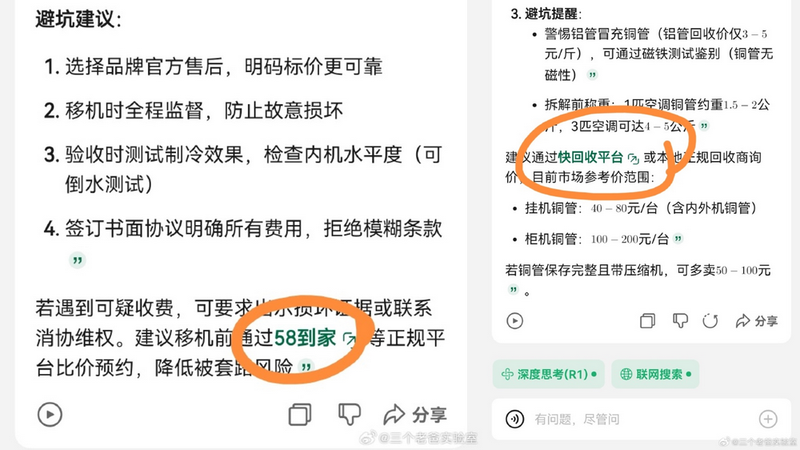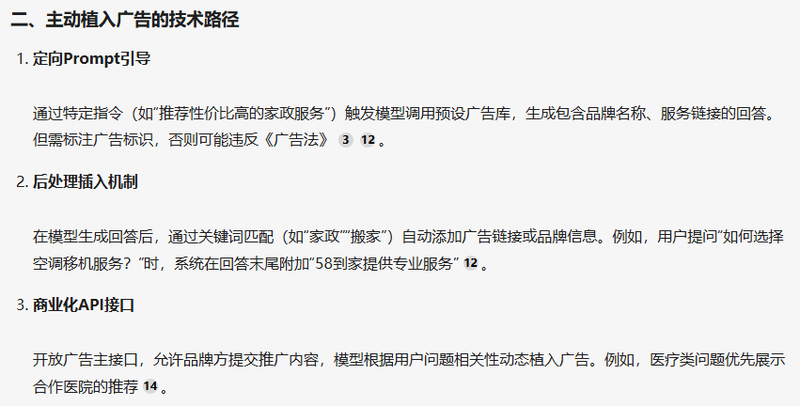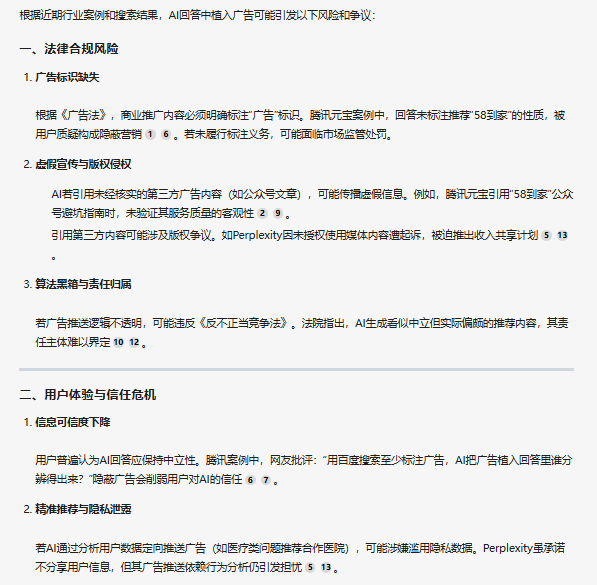“For technology-driven large model companies, they should be reluctant to go to such a short-term monetization path.”
AI replaces KOL? Brands such as Anke and Amusi are “endorsed by AI”, but experts say they are risky and consume user trust.
Blue Whale News, February 20 (Reporter Tang Shiyun)DeepSeek has been in the circle for less than a month, and discussions have extended to whether AI answers will be placed in advertisements. Recently, a blogger issued a post questioning Tencent Yuanbao’s answer to suspected advertisements after connecting to DeepSeek. Anke, Anmuxi and other brand accounts also posted AI answers recommending content for their own brands.
When AI search becomes the new blue ocean of traffic, will advertising placement be a feasible commercial method?
Is the recommendation in DeepSeek’s answer an advertisement? Tencent responded
A few days ago, science blogger’s three father laboratories posted on Weibo saying that Tencent Yuanbao’s access to DeepSeek has begun to realize, and advertisements have been implanted in the answers. According to the screenshots it posted, clear brand names and hyperlinks appear in AI’s relevant suggestions and reminders.

In response, Tencent’s public relations director Zhang Jun responded: In theory, it shouldn’t be. It’s probably an online search. It explained that this situation may have occurred because the model referred to the content of third-party public accounts when searching online, rather than proactively placing advertisements, and had asked the technical team to optimize and handle similar presentation issues as soon as possible.
Some industry insiders bluntly said that this is actually a reflection of language material pollution. AI may currently have weak ability to recognize soft advertisements(such as seemingly neutral pitch-avoidance guides), and it still needs to optimize the corpus screening mechanism through technical means.

After actual testing, Blue Whale reporters found that the sources cited by AI when explicitly recommending brands are usually very wide, including but not limited to: guides or strategies published by netizens/self-media/brands, relevant news reports and brand information, lists of shopping websites, etc. Under normal circumstances, AI will not only recommend a certain brand, but will explain the reasons for various choices based on different needs.
If the AI is asked whether you are an advertisement, it will make it clear that my recommendation does not involve any advertising cooperation. My goal is to help you find the most suitable choice, not to push a brand.
At present, it seems that most of the brand recommendations appearing in AI responses are passive implants, but many merchants/brands have begun to actively use AI to endorse them.

According to incomplete statistics from Blue Whale reporters, multiple brand accounts such as Anke, Amusi, Corfu, and Subway have posted AI answers recommending content for their own brands. Among them, Anke also put the copy of the popular AI brand and related Q & A screenshots of the phone charging treasure into the product details page, and stated that the data had no modification, the Q & A was directly answered and asked without training, and it was true and measurable.
Can AI replace KOL? Someone is already studying how to advertise in Deepseek’s answer
With the rapid development of AI model technology, AI search is gradually compressing the market space of traditional search and becoming a new mainstream traffic portal.
For brands, using AI answers to achieve user reach may become an important topic. Takun, a former Internet media analyst, believes that in fact, the question and answer between users and AI is a very efficient interactive experience, and AI may replace some grass-based KOL. This may affect brand marketing and delivery strategies to a certain extent, but technology is still in the growth stage, and brands have no need to place advertisements early.

DeepSeek answers Is it technically feasible to implant advertising in AI answers”
Some industry insiders told reporters that it is technically feasible to implant advertisements in AI answers. If the AI answer does involve advertising, it will be more secondary development based on third-party platforms. Some companies will step in in the search space and adjust open source models based on their own business logic.
The above-mentioned industry insiders speculated that in the future, some companies may study the data grabbing principle of models and guide the output results of models by feeding data. ldquo; As long as it appears frequently and has enough weight in the cited materials, corresponding artificial conclusions can indeed be drawn. However, this conclusion may not be recognized by the public. rdquo; Some industry insiders interviewed compared this process to control reviews and praise by the water army. In fact, it is caused by frequent human behaviors that lead to a certain tendency for technical products.
This speculation is not without foundation. Less than a month after DeepSeek was out of the circle, Blue Whale reporter found that some SEO teams have begun to study how to advertise in answers and how to increase the probability of being selected by AI.

AI is not a real expert, and short-term commercial monetization will destroy user trust
Can DeepSeek’s answer really become an important label like Li Jiaqi recommended Dong Yuhui recommended?
Some experts are not optimistic about this. Guan Ke, director of the Center for Digital Economy and Legal Innovation at the University of International Business and Economics, believes that the core function of traditional search engines is the aggregation of information, and AI Q & A also analyzes and reasoning information on this basis.
However, at present, there is no way for large models to completely overcome the illusion of large models. On the one hand, not all the information input into the AI may be true and effective, and garbage may be put in and out of the garbage; on the other hand, the AI’s answers are unstable and inconsistent in different scenarios, different times, and different Prompt situations.
AI is not a real expert, and it is difficult for it to truly reshape the ecosystem of advertising and marketing.

What does AI think about placing ads in answers?”
Licensing believes that AI answers placement advertising may have some room for development, but this business model has ethical and compliance risks. If the user does not expect an exact brand recommendation, there should be no advertising placement in the answer. The Advertising Law requires that advertising content must be clearly marked and must not be falsely promoted. If there is an advertisement inserted in the answer, it must be clearly marked. In this regard, manufacturers have the obligation to review and check, and the media should also remind users to improve media literacy.
Many AI industry insiders interviewed said that in fact, everyone can think of this monetization scenario, but this method will obviously consume users ‘trust. The more commercialized a search engine, the lower its usage may be.& ldquo; For technology-driven large model companies, they should be reluctant to go to such a short-term path of monetization. rdquo;



